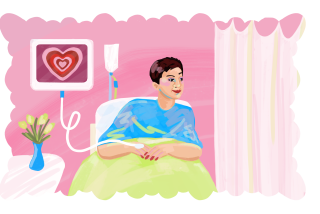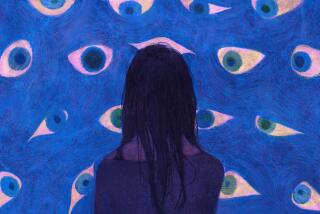Un-Holy Mackerel!
- Share via
Damn that mackerel I had in Nha Trang! And to think I’d spoken well of it.
“Delicious,” I told the Vietnamese waiter. “Quite delicious.”
Four hours later, I was in an emergency room, preparing myself for death. I should have remembered what they say in Africa: Before you praise a meal, wait a day.
After my fish dinner that night five years ago--and little knowing what lay in store for me--I spent an hour in a coffeehouse, a small room open to the street, its rattan chairs and tables spilling onto the pavement. The owner was an old man with a single tooth. As a hobby, he restored umbrellas and was openly contemptuous of the one I carried, which I’d bought in Kuala Lumpur. “The Malaysians don’t know how to make umbrellas,” he said. “The French do, of course. And the English.” But that was added to please me, I suspect. I’d just informed him that I hailed from London.
I ordered coffee and eclairs for myself and three of his friends and was given a check for the equivalent of 70 cents. “I want to pay for everyone,” I said. The old man smiled. “You are paying for everyone.” The bank notes I gave him had Ho Chi Minh on one side and, on the other, such socialistic love objects as tractors, factories, shipyards and oil platforms.
My pockets bulged with money. Just that morning, I’d changed $100 and had been given 200 5,000-dong notes. I was a millionaire!
“You’re looking pale,” said the old man. “Are you all right?”
“I feel a bit weak all of a sudden,” I said. “I think I’ll make it an early night.”
With some difficulty, I struggled back to my hotel, where the clerk was listening to an English-language tape. “Mr. Smith is wearing gray trousers,” I heard. “Mrs. Smith is wearing trousers too. But hers are blue.”
I was now feeling awful. I was sweating badly and my right kidney had started to ache. To remain standing, I had to clutch the reception desk.
“I’m not feeling very well,” I told the clerk. “I need a doctor.”
Twenty minutes later--the pain had grown appreciably worse--two people wearing white jackets came to my room and took my blood pressure. “I’m in agony,” I said. But they shook their heads. They spoke no English. They took my blood pressure a second time, after which they seemed at something of a loss. (It struck me later that this may have been the only medical procedure they felt competent to perform.) And then the clerk turned up. “Tell them I’m in agony,” I told him. “Yes, I have,” he said.
“They can’t have understood. Tell them I want a painkiller.”
“Yes.”
“Please. Tell them now.”
“Yes.”
His English was limited too, it turned out. If he wished to, he could rattle on at length on the color of Mr. Smith’s trousers, but when it came to describing my symptoms to a pair of paramedics he came up short.
All three of them were looking frightened, and I understood why. The government had been urging the Vietnamese to be nice to tourists. And here was one threatening to die right under their noses. To paraphrase Robin Williams, this would not look good on their resumes.
I passed out at this point. I vaguely remember being wrapped in a blanket. And then I was half-sitting, half-lying in the back of a moving car. Someone in the front seat was calling out a cautionary warning to the driver. A dozen bicycles had burst from the gloom like a shoal of fish and veered across our path.
“We’re taking you to the emergency department,” said a man whom I hadn’t seen before. It had been raining, and the umbrella he was holding was dripping on my knee. “Where’s your passport?”
The pain now was as much as I could bear. “I don’t give a hang about my passport,” I said.
“But you should,” said the man. “If it’s in your room, someone will take it.”
The clerk, who was sitting beside me in the car, was incensed. “No one has ever stolen anything in my hotel,” he shouted. “No one!”
But the man with the umbrella refused to be persuaded and--ignoring my pleas that if I didn’t see a doctor immediately, I would surely die--we headed back to the hotel.
*
The emergency department, when we finally got there, looked more stricken than I did. Old, dilapidated and very primitive, it brought to mind a Victorian workhouse. Six iron bedsteads lined one side of a badly lighted ward. The walls were painted blue and, in places, holes had been knocked in them. Five of the beds were occupied. In one was a small boy who had fallen from a tree and, next to him, a woman whose legs were badly swollen. An old man with chronic asthma lay gasping for breath in the bed to my right and, to my left, were two men, both badly bruised, each of whom accused the other of having assaulted him.
The staff consisted of a doctor, who spoke excellent English, and six nurses who, though they were taking lessons, spoke very little. One of the latter had a piece of black cloth pinned to her blouse. She was grieving for someone, the doctor told me later.
My blood pressure was measured yet again. And then I signaled that I was going to be sick. But no one understood, and I ended up vomiting all over the bed. I lay there afterward, no longer sure which would kill me first, the pain or the embarrassment. It was one of those times when I wished I’d been a smoker. I could have used a steadying cigarette.
The doctor wore horn-rimmed glasses and a green nylon shirt. Though in his early 30s, he looked like someone still in his teens. “How are you feeling?” he wanted to know. “Dreadful,” I said. “You’ve got to give me something to relieve this pain. I don’t mind dying as long as it doesn’t hurt.” (Next day, he referred to this. “You must have been delirious,” he said. But I wasn’t. I meant every word.)
Over the next six hours, I was given two glucose transfusions--I was dehydrated, I was told--numerous pills and several injections. “I hope you’re not afraid of getting AIDS,” said the doctor, withdrawing a syringe from my arm. “We clean these things as best we can. But our resources are limited.” Limited, indeed. At one point, freezing cold, I asked a nurse for a second blanket. “Sorry,” she said. “We have six beds and six blankets. You have yours.”
It took some hours, but the pain did abate finally. And then I was faced with another problem. All those fluids made it necessary to urinate. Which was far from easy. I was horribly weak, and the toilet didn’t have a light. But worst of all, my movements were restricted--first by the intravenous needle taped to the back of my hand, and then by the glucose bottle, which I held cradled in my armpit as if it were a football. Should you ever find yourself in this kind of situation, my advice is this: At all costs, avoid sudden movements.
The man in the next bed, the asthma victim, was feeling better as well and was now able to talk. “I speak French like a Frenchman,” he said. “I never bothered to learn English. But if I had, I would speak it like an Englishman.” His great love was the music of the Corsican tenor Tino Rossi, he told me. “Of course, he’s passed on now.” Another favorite was Mario Lanza. “Also passed on. What wonderful songs. When I was young, I sang myself.”
A nurse brought me a cup of tea. She said her favorite English words were “coffin” and “corpse.”
“ ‘Mortuary’ is a nice word too,” I said. But she shook her head; it didn’t appeal to her. She said she’d once thought of killing herself because she didn’t have a boyfriend. She laughed. “Like Romeo and Juliet.”
At 3 a.m., it was decided that I was well enough to be discharged. “What do I owe you?” I asked the doctor.
“Can you afford $10?”
“Oh, I must owe you more than that.”
“No, $10 is enough.”
I got back to the hotel in a tri-shaw, stopping several times on the way to be sick. I fell asleep and felt better when I awoke. The hotel sent flowers to my room. “I hope your health will get more better,” said the cleaning woman. She told me that she and an American soldier had fallen in love in 1972, and he had begged her to return to the States with him. “My mother wouldn’t let me go. I wish she had. I think about him every day.” Then she still loved him? “Of course,” she said. “I’m married now, but it’s not the same.”
*
Toward noon, my back began to ache again. “Oh, God,” I prayed. “Forget all the other stuff I’ve asked for. Just make me well.” At 3, the doctor arrived, still wearing his green nylon shirt. He gave me another transfusion, in the course of which I fell asleep.
When I woke up, the pain had gone. It was dark now, and the doctor was sitting on the other side of the room listening to my Walkman. Did he like it? I asked. Very much, he said. Did he have one of his own? Oh, no. Such things were quite beyond his means. “Then have mine,” I said. “And take the tapes as well.” I loved those tapes: Van Morrison’s “Tupelo Honey,” “His Band and Street Choir” and “Moondance.”
But what the heck! I owed this man my life.
He invited me to his house for dinner. His mother had cooked a chicken--very expensive in Vietnam--because “you need the nutrition.” The meal started with jasmine tea and finished with bananas. To indicate how delicious I found it, I blew a kiss--the way the French do when they like something. The doctor looked suddenly anxious. “You want to vomit?”
His wife was pregnant with their first child. “If you have a baby in the house, your family will always be cheerful,” she said. She told me as well that when her husband returned from work that morning, he said, “I’ve made a new friend.”
I began to feel more kindly toward that wretched mackerel. If I hadn’t eaten it, I’d never have met these lovely people.
“I love you because you’re happy,” said the doctor’s wife.
“I am happy,” I said. “Happy to be in Vietnam; happy to be alive.”
More to Read
Sign up for The Wild
We’ll help you find the best places to hike, bike and run, as well as the perfect silent spots for meditation and yoga.
You may occasionally receive promotional content from the Los Angeles Times.






